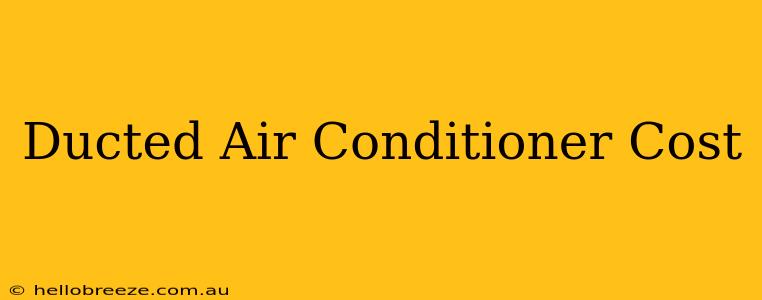Are you considering installing a ducted air conditioner? Knowing the ducted air conditioner cost is crucial before you begin. This comprehensive guide breaks down the various factors influencing the price, helping you budget effectively for your new climate control system.
Understanding the Variables Affecting Ducted Air Conditioner Cost
The price of a ducted air conditioner isn't a one-size-fits-all figure. Several key factors contribute to the overall expense:
1. System Size and Capacity
The size of your home and the cooling capacity you need are primary determinants of cost. Larger homes naturally require larger, more powerful systems, leading to a higher upfront investment. Capacity is measured in kilowatts (kW) and is chosen based on the square footage of your home and its insulation levels. A professional assessment is vital for accurate sizing.
2. Type of System
Several types of ducted air conditioners exist, each with its own price point:
- Reverse cycle systems: These offer both heating and cooling, generally costing more upfront but saving money in the long run.
- Single-phase systems: Suitable for smaller homes, these are generally less expensive than three-phase options.
- Three-phase systems: Better suited for larger homes requiring higher cooling capacity, leading to a higher initial cost.
- Inverter technology: Inverter systems offer precise temperature control and improved energy efficiency, though they usually command a higher price.
3. Installation Complexity
The complexity of the installation significantly impacts the cost. Factors include:
- Existing ductwork: If you have existing ductwork that can be reused, it will significantly reduce the installation cost. However, if significant modifications or new ductwork installation is necessary, the price will increase substantially.
- Home accessibility: Difficult-to-reach areas or obstacles can increase labor costs.
- Location of the outdoor unit: The placement of the outdoor unit can also influence installation time and cost.
4. Brand and Quality
Brand reputation and the quality of components influence price. Premium brands often come with a higher price tag but may offer superior performance, longer warranties, and enhanced features.
5. Additional Features
Many modern ducted air conditioners offer advanced features, such as:
- Smart home integration: Allows control via smartphone or other smart devices.
- Zone control: Allows for independent temperature control in different areas of the home.
- Air purification: Filters out dust, pollen, and other airborne particles.
- Quiet operation: Reduces noise levels for a more comfortable living environment.
These features add to the overall cost.
Getting Accurate Cost Estimates
To obtain an accurate estimate of ducted air conditioner cost, it is crucial to:
- Consult multiple installers: Get quotes from at least three reputable installers to compare prices and services.
- Clearly define your needs: Specify your requirements regarding system size, features, and brand preferences.
- Ask about warranties: Understand the warranty coverage for both parts and labor.
- Consider long-term costs: Factor in energy efficiency and running costs when comparing quotes.
Conclusion: Making Informed Decisions
The cost of a ducted air conditioning system is a significant investment, but understanding the variables and obtaining accurate quotes empowers you to make an informed decision. By carefully considering the factors discussed above, you can select a system that meets your needs and fits comfortably within your budget, ensuring comfortable temperatures year-round. Remember to prioritize quality and energy efficiency for long-term savings.

